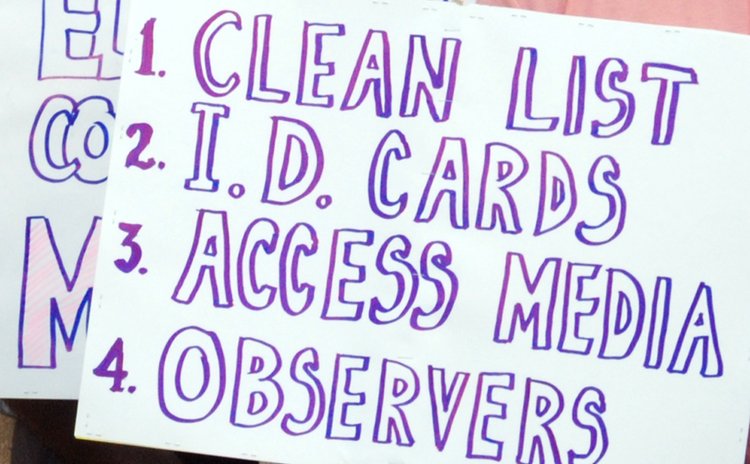Dominicans ask yourselves this question: Why are you making the process of electoral reform so difficult and potentially so self-destructive

Like a runaway train Dominica seems to be heading towards a disastrous crash. Yet many of the passengers and crew are apparently too drunk on hubris, too unconcerned that the train they are riding on is about to plunge into the darkness of protest and tear gas, of anarchy and hate, of blue vs red, of brother vs brother, of neighbours vs neighbours. The runaway train is the potential civilian confrontation over electoral reform, before the next general election.
For many years now we have been hoping that someone would heed the warning, recognise that there is disaster ahead and bring the disagreeing parties together to head off the catastrophe.
We were hoping that that person would have been His Excellency President Charles Angelo Savarin, the Head of State, who selects the chairman of the Electoral Commission in his "own deliberate judgement". And one of the president's major roles, we assumed, would be to advise, persuade, and assist in finding a workable solution to the current impasse between the ruling Dominica Labour Party (DLP) and the many groups, including two opposition parties who are leading the charge towards electoral reform.
Nevertheless, last week we heard a perturbing statement on the issue of electoral reform from President Savarin as he addressed Parliament just before Prime Minister Roosevelt Skerrit presented the 2019 - 2020 budget. We would have expected Dominica's President, our Head of State, to take a middle ground, no matter what he personally believes, on such a controversial issue as electoral reform. But President Savarin's statement seems to be a reproduction of the DLP's argument for its inflexibility on electoral reform: the system has worked well and it's working well.
Here's what the president said: "This upcoming poll is expected to be peaceful as well as undertaken in a manner consistent with international best practice. The system or regime for conducting a free and fair poll in Dominica is in place and has been so for several decades. Indeed even before the attainment of independence in 1978.
"Madame Speaker, no system anywhere is perfect. Indeed in the struggles of life there's always room for improvement of our various systems and endeavors and that principle applies to our electoral system as well. But generally that system has served us in good stead over the years and all three of our major political parties have won and lost elections under the existing system."
The President's statement to parliament last week seems to be an echo of parts of an address to the nation on electoral reform by Prime Minister Skerrit. In his statement on June 28, 2019 Mr. Skerrit said:
"We have an electoral system in Dominica that is unchanged since 1978, which has allowed the conduct of credible elections at every general election. We have seen all of the major political parties voted into and out of power under the same system".
The Chairman of the Electoral Commission, Gerald Burton, also provided the same basic argument when he spoke before the Dominica Association of Industry and Commerce (DAIC) in April 2019: "I am of the view however, that any objective observation of our existing electoral process would have to agree that it has provided us with very credible expressions of the will of the majority of the people of Dominica over the years. And I make bold to say that it remains capable of doing so."
Nevertheless, Burton acknowledged that "sixty- eight years is indeed a long time in the life of any system and the electoral system is no exception. For a very long time, there has been the recognition that reviews and modernization was required".
Additionally, Government's spokesman and lead attorney Anthony Astaphan has also argued, like the President and the Chairman of the Electoral Commission and the Prime Minister that the system that Dominica has been using for the conduct of general elections has worked well and is working well.
"We have had elections since at least 1980 with the very same process and Register. Since 1980 and most definitely since 2000 there has been no credible allegations or claim of the Register having compromised an election or lead to corrupt practice," Astaphan wrote on page 23 of his booklet: Commonwealth of Dominica: Electoral Reform, MYTH OR FACT?"
And then last week Joseph Isaac, the Minister of Climate Resilience and Urban Renewal (the former United Workers Party parliamentary representative for Roseau Central and currently the DLP candidate for Roseau North) tried to walk back his position on electoral reform when he was a member of the UWP. He described electoral reform as a UWP "red herring".
Isaac said on a DBS Radio programme: "Governments have changed for many years without electoral reform that they asking for. Freedom Party came in, they won, same electoral laws, same thing. Labour came in they won. Workers actually won some seats that they did not actually have without the same electoral reform they talking about so they are just looking for something to talk about".
But one could argue that the results of general elections from 1980 onwards could have been much different if the system had been upgraded periodically and the playing field was more level. Workers could have lost, Freedom could have stayed out, Mr. Isaac.
Again the DLP argument contradicts the Commonwealth Observer Group that declared the 2014 general election to be free but definitely not fair. Additionally, many of the countries of the Caribbean inherited a similar electoral system and have held general elections for as long as we have had elections. Yet Jamaica and Antigua and St. Kitts, for instance, have implemented electoral reform over the past two decades without fracas.
So why is Dominica making this process of electoral reform so difficult and potentially so disastrous?




